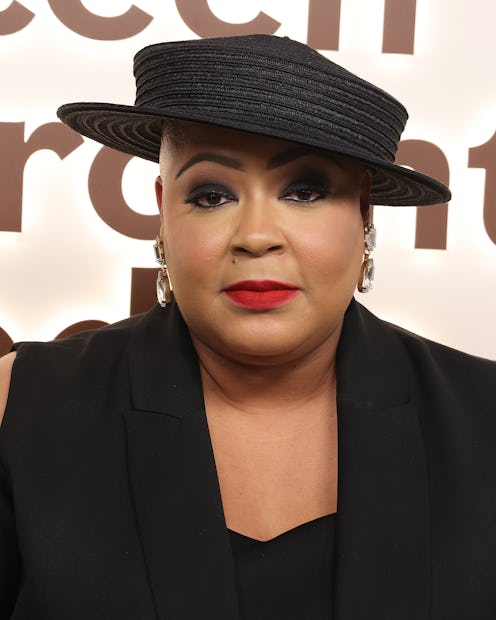Amplifying Our Voices
The 15 Percent Pledge Director Shares The Impact Of Supporting Black Business
“Closing the racial wealth gap is good for all people, not just Black people,” LaToya Williams-Belfort said.

When the Fifteen Percent Pledge was first founded in May 2020 by Brother Vellies’ Aurora James, the ask was clear: dedicate 15% of retail space to Black-owned businesses. The Black population makes up roughly 15% of the United States, a fact that should be equally represented on shelf space.
In recent years, the United States has experienced both an economic recession, including a 40% decline in Black business ownership, as well as a massive, nation-wide racial justice movement. However, what started as a surge of support for Black-owned businesses resulted in a lack of follow-through. This is what the Pledge is still aiming to address, two years after its creation.
Executive Director of the Fifteen Percent Pledge LaToya Williams-Belfort says that, thus far, “625 Black businesses have created partnerships with our 29 retail partners,” a feat that “translates into $10 billion of relationship, equity, and dollars.”
Ahead, Bustle speaks with Williams-Belfort to discuss the impact the Pledge has had since its launch and her hopes for the future of Black business.
What goals is the Fifteen Percent Pledge working towards today?
One, to amplify as many Black founders as possible. We are also working with our 29 pledge-takers that sign contractual commitments to create opportunities — whether they be pop-ups, online marketplaces, different strategic opportunities to further cultivate and support the Black businesses that are in their assortments — and to create opportunities for emerging Black businesses who are not yet on their shelves.
We're also working with Google Shopping, who is the partner that powers our business equity community — which is the community of over 2,000 Black businesses that we work to cultivate and develop to get shelf-ready. We're doing some online shopping guides and product features and founder features with Google Shopping, as well. Closing the racial wealth gap is good for all people, not just Black people.
What is the difference between a business adhering to the pledge versus making a contractual agreement?
Saying that you are adhering to the pledge is a step in the right direction, because that acknowledges that within your structure, you value and understand the business importance of partnering with Black brands. However, taking the additional step to actually sign a data-informed contract that is a multi-year commitment solidifies that you are going to do this work in the right ways, and that you are going to be accountable to the goals, the data, the infrastructure, and the technology that is needed to reimagine a new business function that is inclusive of the needs of the Black entrepreneur.
The pledge works as a strategic partner, a thought partner, a feedback mechanism. We have account directors, we have team members that work with our contractual pledge-makers to meet these goals and to be held accountable.
There was a lot of excitement when the Pledge first launched in summer 2020, but some brands have faltered from their public commitments. How has that affected Black businesses?
I think that compassion fatigue is a real thing. In 2020, we were having very difficult, courageous conversations about race. Over the last two years, the news cycle changes, the conversations become tiresome. The stress and trauma of systemic racism is real. That’s why the accountability piece is so important. We know that certain things go into the news cycle, certain promises are made, but if there's no mechanism in place to be the accountability partner, those things are not pushed forward with the same momentum as when they are announced.
What should people keep in mind about their own shopping habits and how those impact Black businesses?
The biggest thing is the individual's economic power. Because sometimes when you have a big societal problem, we as individual community members don't think that we have a real impact. As consumers, our shopping habits are generational.
The information age is really important — to research products, learn about founders, learn about what their brand story is, and how they're thinking about their products. Learning what products in the market are made by Black businesses that are comparable, better, newer, or more sustainable and thinking about your shopping that way.
What is next for the Pledge?
One of the big things that we hear through our feedback channel is that Black entrepreneurs really want more in-person opportunities to create community. We have some future activations coming up. We have a lot of plans to continue to cultivate community in-person.
What are you most excited about for the future?
As long as we continue to work, we are creating more opportunity, more visibility, more access for Black businesses. The trickle-down is closing the racial wealth gap and creating generational wealth, equitable business opportunity. Personally, I have two Black sons. My oldest son wants to be an entrepreneur. If we keep doing this with the collaboration of our retail partners and our Black businesses — fingers crossed — my son will show up to a world [with] a professional environment where his ideas, his entrepreneurial journey will be based on the quality of his work. He will have an equitable opportunity.
This interview has been edited and condensed for clarity.